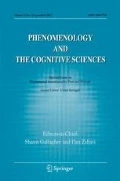Abstract
In The Bounds of Cognition, Fred Adams and Kenneth Aizawa treat the arguments for extended cognition to withering criticism. I summarize their main arguments and focus special attention on their distinction between the extended cognitive system hypothesis and the extended cognition hypothesis, as well as on their demand for a mark of the mental.
Notes
Richard Menary (2007: 195, fn. 2), too, has doubted the need for a mark of the cognitive.
I’m not terribly comfortable with this distinction between “largely conceptual” and empirical theories. But there are theories that seem more empirical – they depend on evidence for their support, can be tested against observations, and so on – than others. My hunch is that theories of content fall on the less-empirical end of what might be a spectrum rather than a division.
For Menary (2007: 15), cognition is the completion of a cognitive task by the manipulation of representations. Of course, this definition would seem to require some further account of which tasks count as cognitive. This aside, clearly this definition of cognition might be more friendly to the possibility of extended cognition than Adams and Aizawa’s.
References
Adams, F., & Aizawa, K. (2001). The Bounds of Cognition. Philosophical Psychology, 14, 43–64.
Aizawa, K. (2007). Understanding the Embodiment of Perception. Journal of Philosophy, 104, 5–25.
Aizawa, K., & Adams, F. (2005). Defending Non-derived Content. Philosophical Psychology, 18, 661–669.
Block, N. (2005). Review of Alva Noë. Journal of Philosophy, 102, 259–272.
Clark, A., & Chalmers, D. (1998). The Extended Mind. Analysis, 58, 7–19.
Cummins, R. (1996). Representations, Targets, and Attitudes. Cambridge: MIT Press.
Dretske, F. (1981). Knowledge and the Flow of Information. Cambridge: MIT Press.
Dretske, F. (1988). Explaining Behavior: Reasons in a World of Causes. Cambridge: MIT Press/Bradford.
Fodor, J. (1990). A Theory of Content and Other Essays. Cambridge: MIT Press.
Haugeland, J. (1995). Mind Embodied and Embedded. In: L. Haaparanta and S. Heinämaa (eds.) Mind and Cognition: Philosophical Perspectives on Cognitive Science and Artificial Intelligence, Acta Philosophical Fennica 58: 233-267, as reprinted in J. Haugeland Having Thought: Essays in the Metaphysics of Mind (Cambridge: Harvard University Press, 1998, pp. 207-237).
Menary, R. (2007). Cognitive Integration: Mind and Cognition Unbounded. Hampshire: Palgrave Macmillan.
Port, R. & van Gelder, T. eds. (1995). Mind as Motion: Explorations in the Dynamics of Cognition. Cambridge: MIT Press.
Prinz, J. (2006). Putting the Brakes on Enactive Perception. Psyche, 12, 1–19.
Rupert, R. (2004). Challenges to the Hypothesis of Extended Cognition. The Journal of Philosophy, 101, 1–40.
Wilson, R., & Clark, A. (2009). How to Situate Cognition: Letting Nature Take its Course. In P. Robbins, & M. Aydede (Eds.),Cambridge Handbook of Situated Cognition (pp. 55–77). Cambridge: Cambridge University Press.
Author information
Authors and Affiliations
Corresponding author
Additional information
Thanks to Ken Aizawa for comments on an earlier draft of this review.
Rights and permissions
About this article
Cite this article
Shapiro, L.A. A review of Frederick Adams and Kenneth Aizawa, The Bounds of Cognition . Phenom Cogn Sci 8, 267–273 (2009). https://doi.org/10.1007/s11097-009-9120-z
Received:
Accepted:
Published:
Issue Date:
DOI: https://doi.org/10.1007/s11097-009-9120-z

